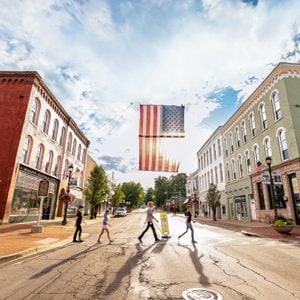Incredible Generosity Makes Red Handed Tattoo in Shreveport the Nicest Place in Louisiana
Updated: Nov. 24, 2022
Learn how the owner of one small-town tattoo shop made a big difference.
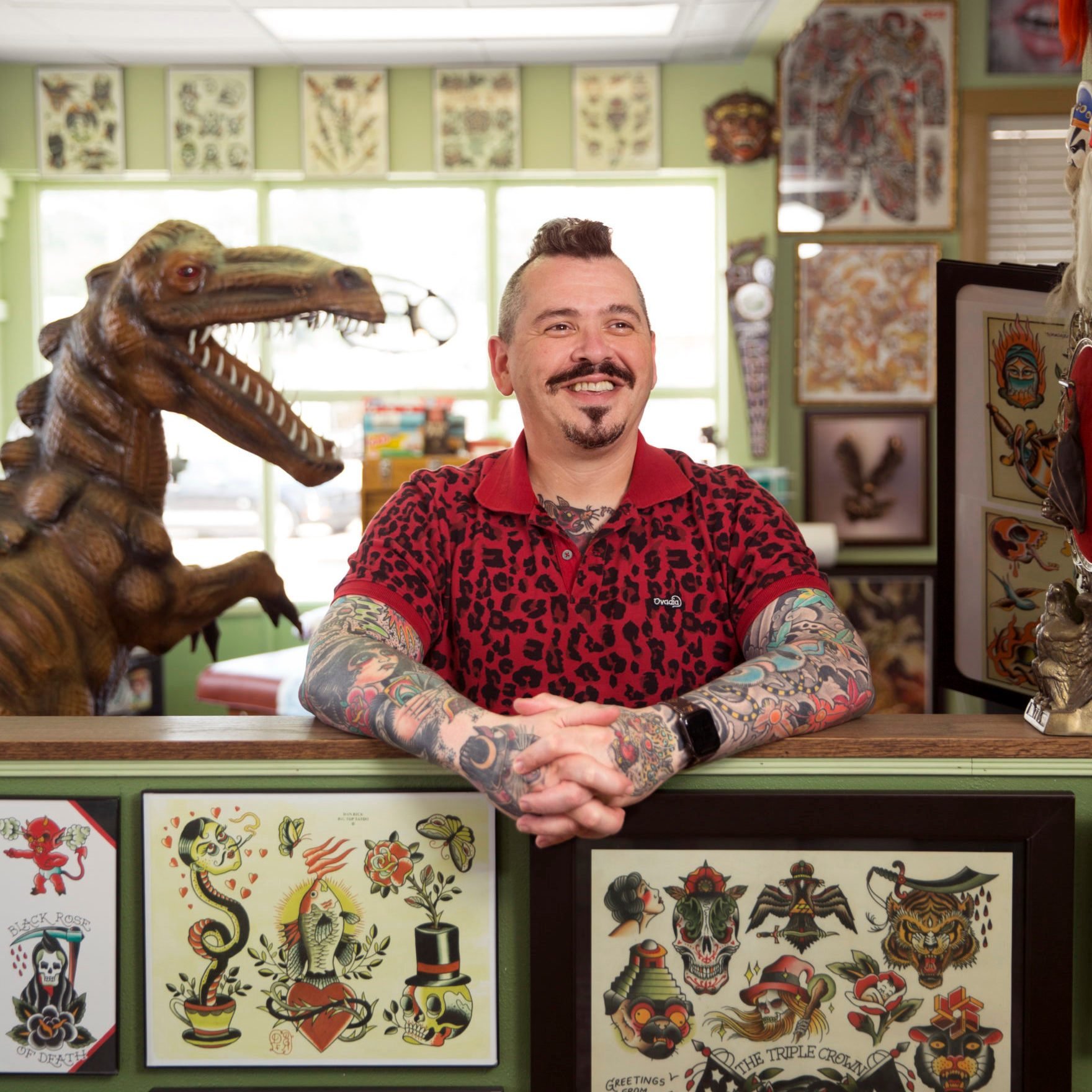
In January of 2020, 20-year-old Joshua Jefferson held up Red Handed Tattoo at gunpoint, took $300, and escaped through a window. When his trial began, Micah Harold, the shop’s owner, was quick to testify—in Jefferson’s defense.
“I want leniency,” Harold, who had also attended Jefferson’s arraignment, said at the time. “I’d give him a job if he wanted.”
That’s the kind of humanity you’ll find in Harold, and in Shreveport, the city that’s home to Red Handed Tattoo. Call it compassion that’s relentless beyond reason. Another example: Harold closed his shop in March, more than a week before Louisiana mandated the closure of nonessential businesses. Why short himself the revenue? Because he was worried that Shreveport wasn’t ready for a spike in COVID-19 cases and he thought he could help.
He started by giving away rubber gloves and rubbing alcohol to anyone who needed them. Within days, he had transformed Red Handed into a kind of general store. Shelves that once held needles and ink were now stocked with groceries and toilet paper. “My tattoo shop looked like a Circle K,” Harold jokes, referring to the chain of convenience stores.
More remarkable: Every item was on sale for the remarkable price of free ninety-nine. Harold, 45, wouldn’t accept a dime. “You see the world differently in desperate times. You start asking, ‘Is this person loving or hateful? Draining or inspiring?’ That’s how I’ve been able to break down the world in light of the pandemic. Everything else falls to the side,” he says.
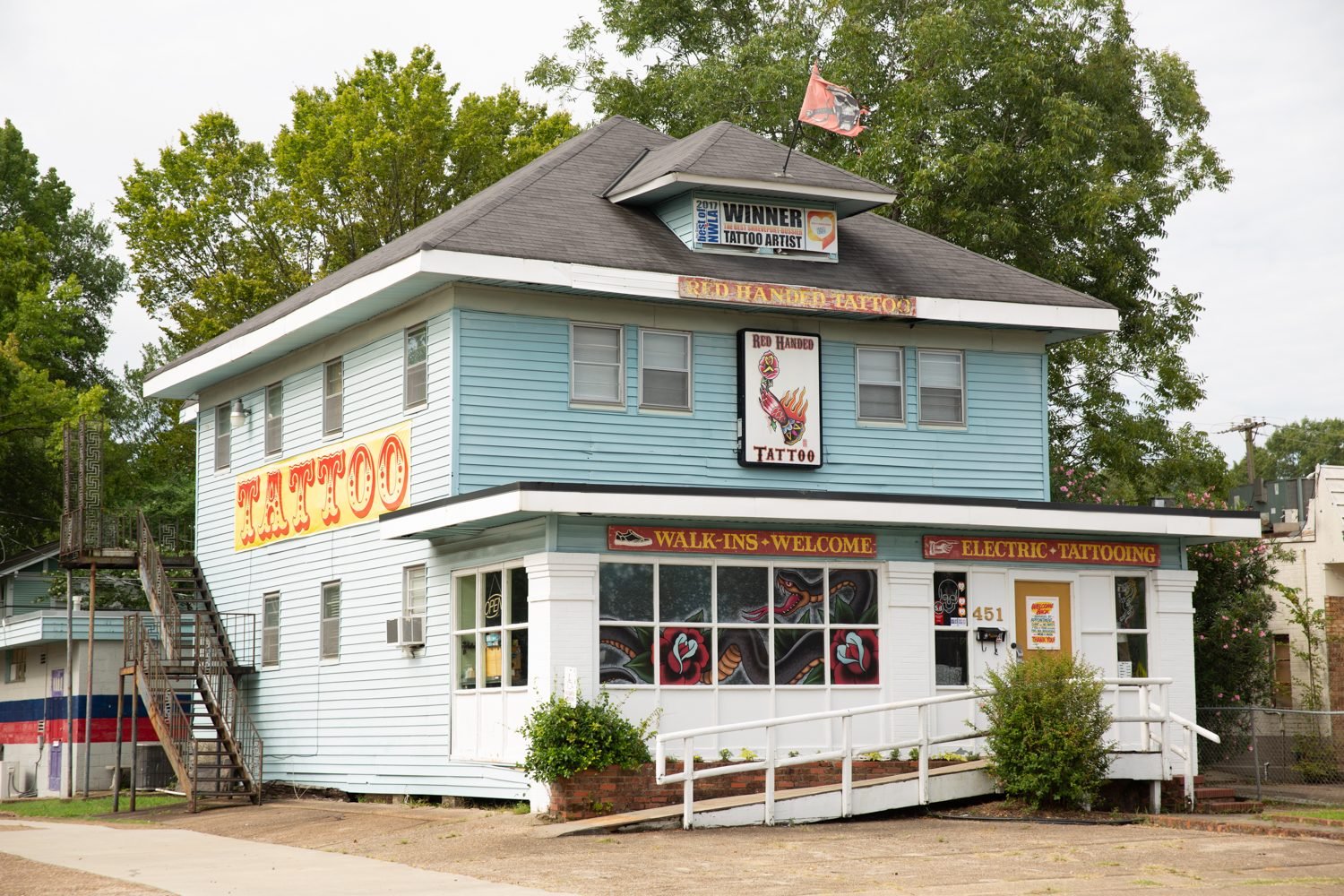 Tucked into a robin’s-egg blue building that flies a red pirate flag on its roof, Red Handed Tattoo is a warm place that’s as notable for the friendly faces inside as it is for the motorcycles in the parking lot. It’s located in an artsy area along busy King’s Highway, so friends and clients have long stopped by at all hours just to say hi.
Tucked into a robin’s-egg blue building that flies a red pirate flag on its roof, Red Handed Tattoo is a warm place that’s as notable for the friendly faces inside as it is for the motorcycles in the parking lot. It’s located in an artsy area along busy King’s Highway, so friends and clients have long stopped by at all hours just to say hi.
Once the pandemic struck, folks still dropped in, only now they brought donations of masks, hand sanitizer, and anything they could spare from grocery runs. Restaurants called to offer food they’d no longer be able to serve. A manager at the Family Dollar agreed to set aside a portion of the most in-demand products as soon as they came off the truck.
Nearly $10,000 of cash and supplies flowed to Harold’s shop—and from there to where they were needed most. A network of 20 volunteers organized to provide contactless deliveries to residents who had trouble getting around. Soon, even health-care workers at the nearby Willis-Knighton Hospital knew where to get personal protective equipment (PPE) or a thermometer when supplies dwindled.
“This pandemic has exposed decades of old economic and health disparities,” says Shreveport mayor Adrian Perkins. “Shreveport is full of hardworking people who go above and beyond for their neighbors. Micah exemplifies that selfless spirit.”
You might say that Harold was born into helping. His mother, Deborah Allen, is a longtime equal rights activist. As a social worker, she was deeply involved with the AIDS pandemic in the ’80s, while Harold was growing up. Almost 40 years later, when Shreveport badly needed masks to help combat COVID-19, Harold’s first call was to his mom. She’s also a former fashion designer—and, he says, the best seamstress in town.
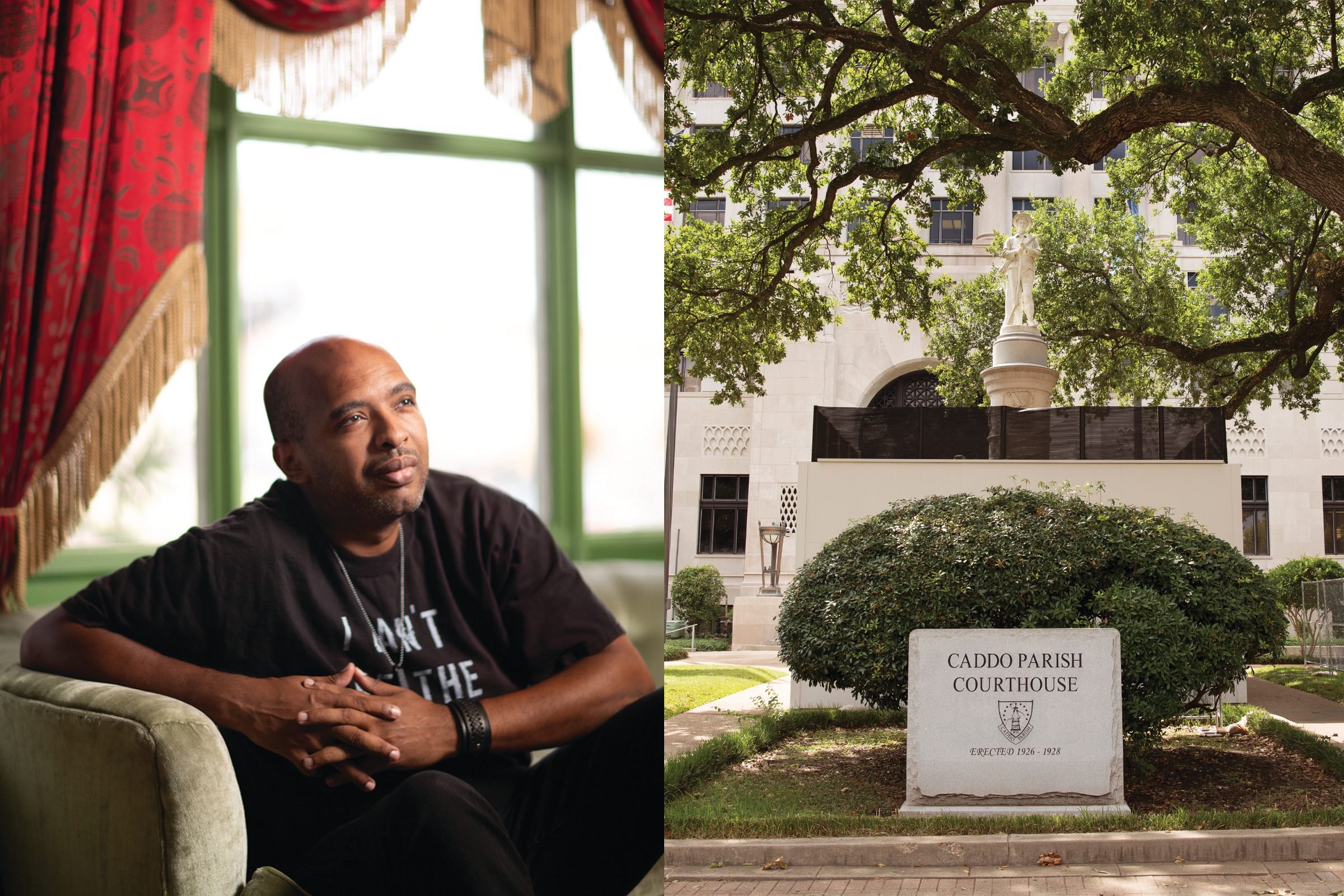
Shreveport is a sprawling city of 190,000 nestled in the northwest corner of Louisiana. No stranger to the regular storms that batter the Gulf, residents often sense when one is coming and prepare quietly—and not only for those bringing bad weather. Like so many working-class cities, Shreveport has had its share of struggles. One of the most recent came on April 6, when a 44-year-old Black man named Tommie McGlothen Jr. died in Shreveport police custody after being detained on suspicion of breaking into a car. The anger started at a slow boil.
“Every Saturday was like a barometer,” says Will James, 42, a community activist and performance artist. “You knew a storm was coming, and you could smell the rain in the air.”
After the May 25 death of George Floyd, the commitment to protesting racism and McGlothen’s death only grew. On June 1, Omari Ho-Sang, 30, a civil rights activist, launched a movement called 45 Days of Action. The idea was to hold an event—talks, marches, voter registration drives—every day for 45 days, each with the goal of improving life in the city and beyond.
On June 4, hundreds of people joined a Justice for Tommie march downtown. “We provided PPE and masks, making sure that people stayed socially distant, so we could get our message out without increasing COVID-19 numbers,” says Ho-Sang.
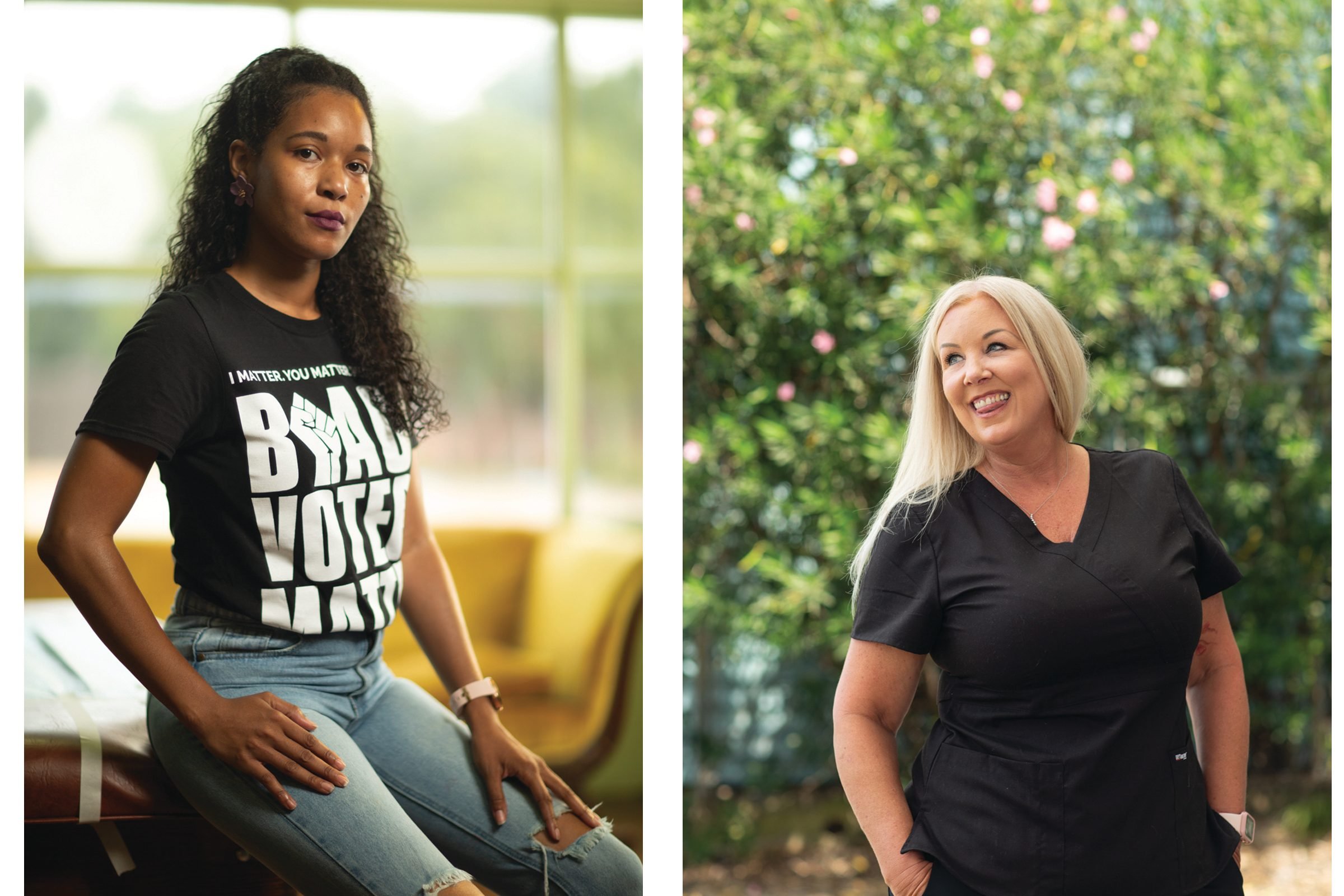
The march was peaceful, but things heated up later that month, outside the Caddo Parish Courthouse. That’s the home of a 30-foot monument built in 1905 by the United Daughters of the Confederacy to honor “the men who gallantly, nobly, and conscientiously defended the cause.” It features busts of Robert E. Lee, Stonewall Jackson, and other Confederate soldiers.
James, a Shreveport native who remembers the bad old days when robed Ku Klux Klan members freely marched through the streets, has long seen the problem posed by the Confederate tribute, and he has spent the past three years fighting to remove it.
“I can appreciate this as a piece of art, but there’s a right place for everything,” James told the Shreveport Times. “This monument shouldn’t be in front of a place where the 14th Amendment says that we will have equal justice for all.”
In the early days, James protested alone, delivering theatrical monologues highlighting the pain that discrimination can bring. But as monument protests gained currency across the country, so did those in Shreveport. Hundreds of people began regularly showing up to watch James and support his message.
On June 27, with little warning or provocation, 140 counter-protestors massed across the street from James’s usual spot, brandishing guns and shouting hateful words. James stayed on the mic for hours that day, telling the gathered to keep the faith until his voice gave out. Others then took turns speaking, and the crowd became so engrossed in one another’s shared hopes and fears that they just tuned out the shouts from the opposition. Finally the counter-protestors left—and never came back.
“It turned into a moment that brought unity when there was anger an hour before. It shows how deep at heart we all really want peace,” says James. A few weeks later, on July 20, the United Daughters of the Confederacy agreed to remove the monument to an as yet undecided location.
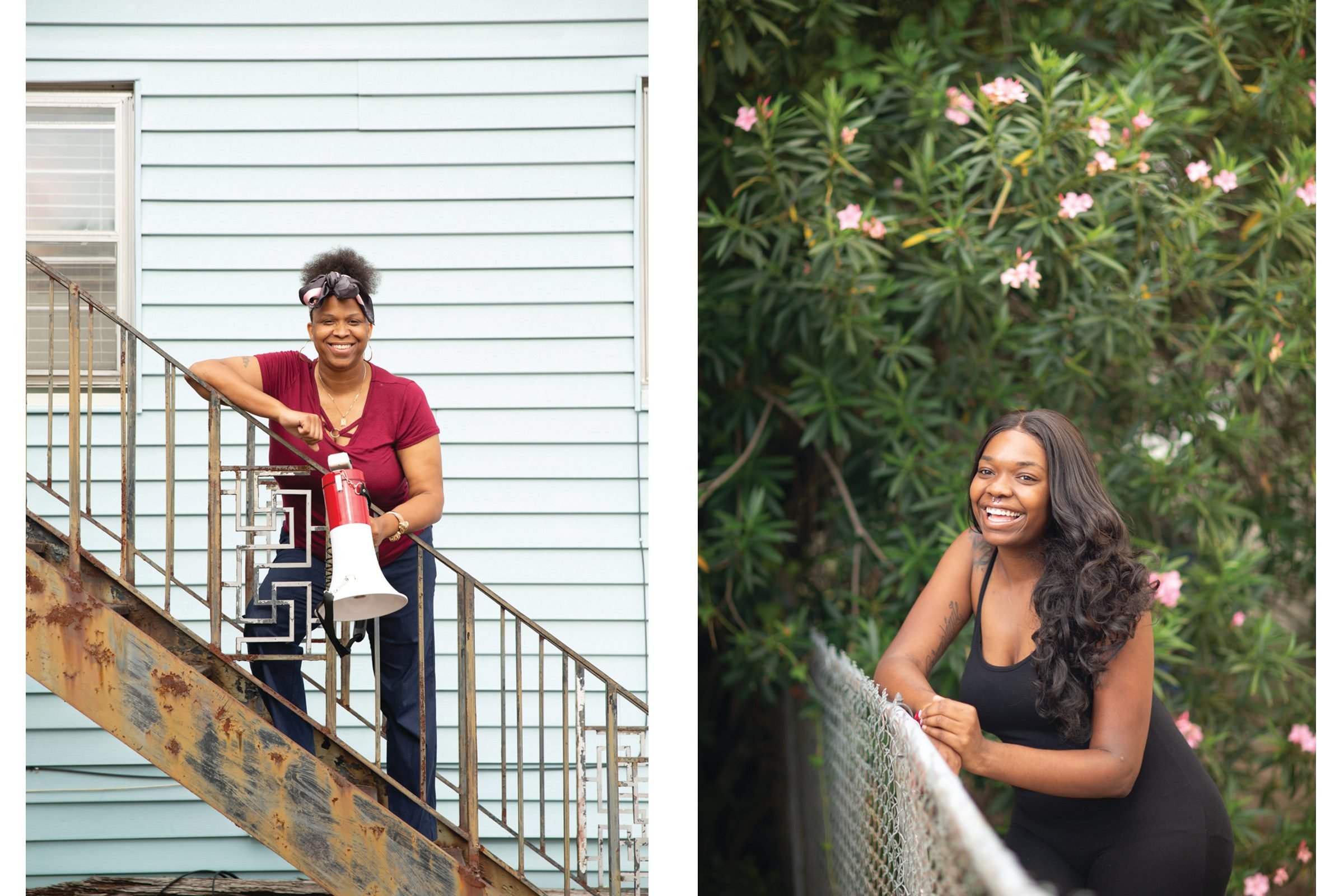
How has Shreveport been able to effect real change with minimal arrests, violence, and property damage?
“Credit goes to the citizens,” says police chief Ben Raymond. “They didn’t want to destroy their city. They just wanted to be heard.”
Not surprisingly, Micah Harold lent a helping hand to the protesters too. Stacie Archibald, a nurse friend who staffed the medical tent at the first Black Lives Matter march following George Floyd’s death, says that rags dunked in ice water, all donated by Red Handed Tattoo, were essential in keeping marchers cool.
In the days since the protests, Harold has kept his “marketplace of caring” up and running, though he has also gone back to his first love: inking designs on people who want to express themselves in their own way. The tattoo shop and the extended family he has found there, both in his staff and customers, have provided Harold with some of the most important connections in his life. One of the most surprising was with the family of Joshua Jefferson, the young man who robbed his store. Throughout the summer, Harold called the Jeffersons every week. Sometimes he even dropped by with groceries.
And then, on August 3, the district court judge, in an unexpected display of leniency, sentenced Joshua to three years of probation—no jail time. As soon as he heard, Harold called Joshua’s father, Melvin Jefferson. “I honestly believe Joshua won’t squander this opportunity,” says Harold. “He made a huge mistake, and he’s learned from it.”
Harold, who survived a nearly fatal widow-maker heart attack last year, is a big believer in second chances. That job he offered Joshua? It’s his when he wants it. “Fear keeps people from making the right moves—they worry about looking like a fool,” he says. “I don’t worry anymore. We all need to make the world a nicer place.”

 In neighborhoods across America, people united to overcome the virus and to fight racial injustice. We received nearly 1,200 stories this year from all 50 states. Red Handed Tattoo in Shreveport was just one of them. You can read 49 more here. We’d like to thank our partner Nextdoor for helping us get the word out and for helping unite American communities.
In neighborhoods across America, people united to overcome the virus and to fight racial injustice. We received nearly 1,200 stories this year from all 50 states. Red Handed Tattoo in Shreveport was just one of them. You can read 49 more here. We’d like to thank our partner Nextdoor for helping us get the word out and for helping unite American communities.

